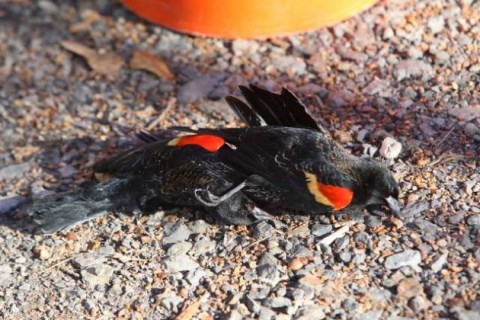Y’all keep thinking these things mean nothing if you want to… Someone went into a large roost of blackbirds in Beebe, Arkansas, as the clock struck midnight Saturday and set off fireworks, contributing to the deaths of scores of blackbirds, a state wildlife spokeswoman said. Last New Year’s Eve, roughly 5,000 birds were found dead in a square-mile area in Beebe, a central Arkansas town about 35 miles northeast of Little Rock through which birds migrate and that is home to a large roost for the birds. Fireworks last year caused otherwise healthy birds to become disoriented and “fly all over the place” into stationary objects, such as trees and buildings, Arkansas Game and Fish Commission spokeswoman Ginny Porter said. Those birds’ deaths were likely “not intentional,” Porter added. But questions remain about the intention of the person or persons who set off fireworks that killed about 200 blackbirds this weekend. In light of the fatalities one year earlier, a state wildlife officer and Beebe police officers were patrolling the area mindful of the dangers that fireworks posed to the blackbirds, the wildlife spokesman noted. Even so, 50 birds died when fireworks went off around 7 p.m. Saturday, said Porter, who added, “We don’t know where or who shot them (fireworks).” The majority of the blackbird deaths occurred five hours later at midnight, in a bunch of trees, or roost, in a residential area. “Someone went into the roost and set off fireworks,” the spokeswoman said. ” We didn’t catch them, we don’t know who.” How bout because your explanation sounds suspect as hell! Over in Europe, another dead animal mystery unfolded. AP reported that on Kvaenes beach in Norway, an estimated 20 tons of dead herring washed ashore on New Year’s Eve. And then, the tens of thousands of dead fish vanished. So how are they explaining this one? As for the vanishing herring, it’s suspected that the fish were forced ashore by predators or a large storm. Jens Christian Holst of Norway’s Institute of Marine Research told AP that the fish probably simply washed back into the sea. Yeah. Okay. Sure. Source 1 Source 2 More On Bossip! *Exclusive* Chris Brown’s Girlfriend “Karrueche Tran” Exposed As Crack Slore Doing Chris For A Come Up [Video] Eclectically Fresh: Solange Shows Off Her Boo And Juelzy In New Photoset From The French Countryside More Divorce Drama: Deion Sanders’ Daughter Says Pilar Is A Liar, Divorce Has Been Going On For Months And She’s Been Getting Chopped Down By Young Boys

























